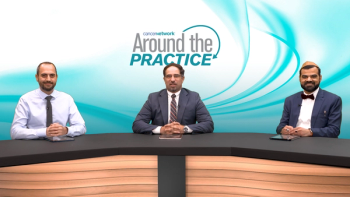CAR T Referral Process: Insights From Kansas

EP. 1: Clinical Perspectives: Utilizing CAR-T Therapy in R/R MM
ByAl-Ola Abdallah, MD,Muhammad Umair Mushtaq, MD ,Jeries Kort, MD ,Zahra Mahmoudjafari, PharmD, MBA, BCOP, FHOPA Panelists discuss how emerging data on chimeric antigen receptor T-cell therapies ciltacabtagene autoleucel and idecabtagene vicleucel for earlier treatment lines in relapsed/refractory multiple myeloma influence institutional decision-making factors for their implementation.

EP. 2: Improving CAR-T Availability and Accessibility: How Does the Earlier Use of CAR-T Impact Treatment Sequencing?
ByAl-Ola Abdallah, MD,Muhammad Umair Mushtaq, MD ,Jeries Kort, MD ,Zahra Mahmoudjafari, PharmD, MBA, BCOP, FHOPA Panelists discuss how institutional challenges around chimeric antigen receptor T-cell therapy slot availability and waiting list management influence treatment sequencing decisions and affect subsequent therapy choices in earlier treatment lines for multiple myeloma.

EP. 3: Selecting Between the Currently Available CAR-T Therapies for R/R MM: Patient Considerations and Criteria
ByAl-Ola Abdallah, MD,Muhammad Umair Mushtaq, MD ,Jeries Kort, MD ,Zahra Mahmoudjafari, PharmD, MBA, BCOP, FHOPA Panelists discuss how patient selection criteria for second-line chimeric antigen receptor T-cell therapy in relapsed/refractory multiple myeloma encompass both clinical eligibility guidelines and practical considerations, including geographical and financial factors.

EP. 4: University of Kansas Medical Center Insights: CAR T Referral Process
ByAl-Ola Abdallah, MD,Muhammad Umair Mushtaq, MD ,Jeries Kort, MD ,Zahra Mahmoudjafari, PharmD, MBA, BCOP, FHOPA Panelists discuss how the chimeric antigen receptor T-cell referral pathway progresses from initial community physician contact through patient evaluation and final selection, highlighting the key steps and considerations in the institutional workflow process.

EP. 5: Reviewing CAR T Mechanism & Treatment Process
ByAl-Ola Abdallah, MD,Muhammad Umair Mushtaq, MD ,Jeries Kort, MD ,Zahra Mahmoudjafari, PharmD, MBA, BCOP, FHOPA Panelists discuss how CAR T-cell therapy, a groundbreaking immunotherapy treatment, works by extracting a patient’s T cells, genetically modifying them to target cancer cells, and reinfusing them back into the patient’s body through a process that involves close monitoring and specialized care

EP. 6: Approaches to Bridging Therapy During the CAR T Manufacturing Process
ByAl-Ola Abdallah, MD,Muhammad Umair Mushtaq, MD ,Jeries Kort, MD ,Zahra Mahmoudjafari, PharmD, MBA, BCOP, FHOPA Panelists discuss how bridging therapy during the CAR T manufacturing waiting period requires careful patient-specific decisions about whether to use chemotherapy, targeted agents, or observation alone, based on disease aggressiveness, patient condition, and expected manufacturing timeframes.

EP. 7: Comanaging Cases of RR/MM in Patients Receiving CAR T
ByAl-Ola Abdallah, MD,Muhammad Umair Mushtaq, MD ,Jeries Kort, MD ,Zahra Mahmoudjafari, PharmD, MBA, BCOP, FHOPA Panelists discuss how successful comanagement of CAR T-cell therapy cases requires close coordination between academic centers and community practices, with structured protocols for monitoring, communication, and patient handoffs, while addressing challenges in referral timing, resource allocation, and long-term follow-up care.

EP. 8: On-going Clinical Trials With CAR T Therapy in Earlier-Line Multiple Myeloma Treatment: Future Perspectives
ByAl-Ola Abdallah, MD,Muhammad Umair Mushtaq, MD ,Jeries Kort, MD ,Zahra Mahmoudjafari, PharmD, MBA, BCOP, FHOPA Panelists discuss how expanding CAR T therapy into earlier lines of multiple myeloma treatment requires careful evaluation of clinical trial data, infrastructure readiness, patient selection criteria, and manufacturing capacity while balancing the therapy’s potential benefits against established treatment approaches.

EP. 9: Expert Insights: 68yM High-Risk R/R MM Post HSCT With Progressive Disease—Next Steps?
ByAl-Ola Abdallah, MD,Muhammad Umair Mushtaq, MD ,Jeries Kort, MD ,Zahra Mahmoudjafari, PharmD, MBA, BCOP, FHOPA Panelists discuss how they would approach a challenging case of a 68-year-old man with high-risk relapsed/refractory multiple myeloma who has progressed after stem cell transplantation, considering factors such as prior treatments, cytogenetic profile, and current fitness status to determine optimal next-line therapy options.

EP. 10: Expert Insights: Key Takeaways & Clinical Pearls on CAR T Therapy in R/R MM
ByAl-Ola Abdallah, MD,Muhammad Umair Mushtaq, MD ,Jeries Kort, MD ,Zahra Mahmoudjafari, PharmD, MBA, BCOP, FHOPA Panelists discuss how CAR T therapy has transformed the treatment landscape for relapsed/refractory multiple myeloma, highlighting critical factors for success including patient selection, timing of referral, management of adverse effects, and the importance of coordinated care between academic centers and community practices.


